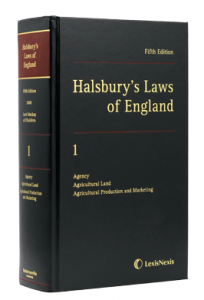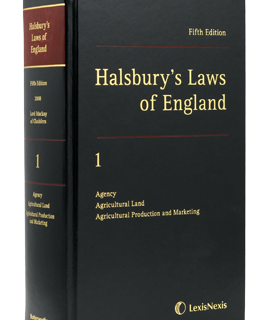
Halsbury’s Laws of England is over 100 years old – we celebrated its centenary in 2007 – but if you think it’s a dusty old has-been, then think again.
As well as an effortlessly stylish addition to any high-flyers boardroom, law library or courtroom drama in its classic black livery, it is a veritable smash hit on LexisLibrary as the second most used source. Every day, Halsbury’s Laws online attracts thousands of views, so if you’re not taking advantage of the expertly-crafted, painstakingly-scrutinised content we have to offer, you need to catch up with the curve.
What is Halsbury’s Laws?
Halsbury’s Laws of England provides the only complete narrative statement of the law in England and Wales. It has been said that in the absence of a written constitution in the UK, we are it. We classify the sum total of the law into subject areas that we present as titles, bookended by Agency and Welfare Benefits (if you think of a Z subject we could use, let us know). We give you the primary and secondary legislation, bundle up the key cases, throw in some EU law, and as truly as your Uncle Bob, you have The Law. You will find no conjecture, no discursive debate and no prediction or extrapolation. Just the law in black and white, which is why we are so often cited in court.
How can Halsbury’s Laws help you?
Halsbury’s Laws can help you answer day to day legal questions, legal issues in the news and answer any research questions set by your tutors.
You can access Halsbury in two ways: print and online with a LexisLibrary subscription. You can also access some Halsbury’s Laws content without subscription on LexisWeb.
In print
The core volume set (made up of over 100 volumes), containing titles as divergent as Landlord and Tenant, Information Technology Law , and Rights and Freedoms, is supplemented by an abundance of indexes, tables and abridgments.
And if you thought that the hardcopy was out of date by the time it hits the shelves, we have an answer for that too, which is the indomitable Noter-Up. This ingenious booklet is produced monthly, and along with the annual Cumulative Supplement, furnishes you with legal developments to each title since its publication.
The print publications that make up a Halsbury’s Laws set are too numerous to expound on here, but if you’d find an explanation of what each product does useful, you can find it via lexisnexis.co.uk
Online
The online content is comprised of three LexisLibrary sources, without which your virtual bookshelf would be bereft. They are:
• Halsbury’s Laws of England: Contains every Halsbury title, with the bonus of having the Noter-Up and Cumulative Supplement updates conveniently inserted into the relevant paragraphs. The latest updates are uploaded every fortnight.
• Halsbury’s Laws Index: As an alternative to using search terms, we’ve helpfully provided our entire Index for the series.
• Halsbury’s Laws Annual Abridgment: A year by year comprehensive survey of English case law, statute law and subordinate legislation.
There are a number of points of entry into Halsbury content. You can search across all LexisLibrary content, search within the Halsbury’s Laws of England source, consult the Index, or browse across our title scheme. And if you have problems finding something, remember that our editors are directly contactable by email.
To show you around some of the Halsbury’s content, we’ve put together a demo, talking through a research question about Moira.
Moira is walking to work via a footbridge over a railway track. As she crosses, she sees that the level crossing beneath has its barriers up. The mechanism for lowering the barriers has broken and Moira sees that a train is approaching. A car crosses the tracks and there is a serious accident resulting in many fatalities. Moira is unharmed physically, but suffers nervous shock. It is found that the crossing failed due to the operator’s negligence in maintaining it. Does Moira have a claim against the operator?
We want you to tell us whether Moira has a leg to stand on. Tweet us your advice to Moira (and queries, feedback, or just say hello!) @halsburyslaws
Halsburys Recording from LexisNexis on Vimeo.
Thanks to Claire Turpin, Commissioning Editor of Halsbury’s Laws of England for this excellent piece. Contact Claire with any questions or feedback.


Does this apply to Scotland or is there an equivalent? Thanks